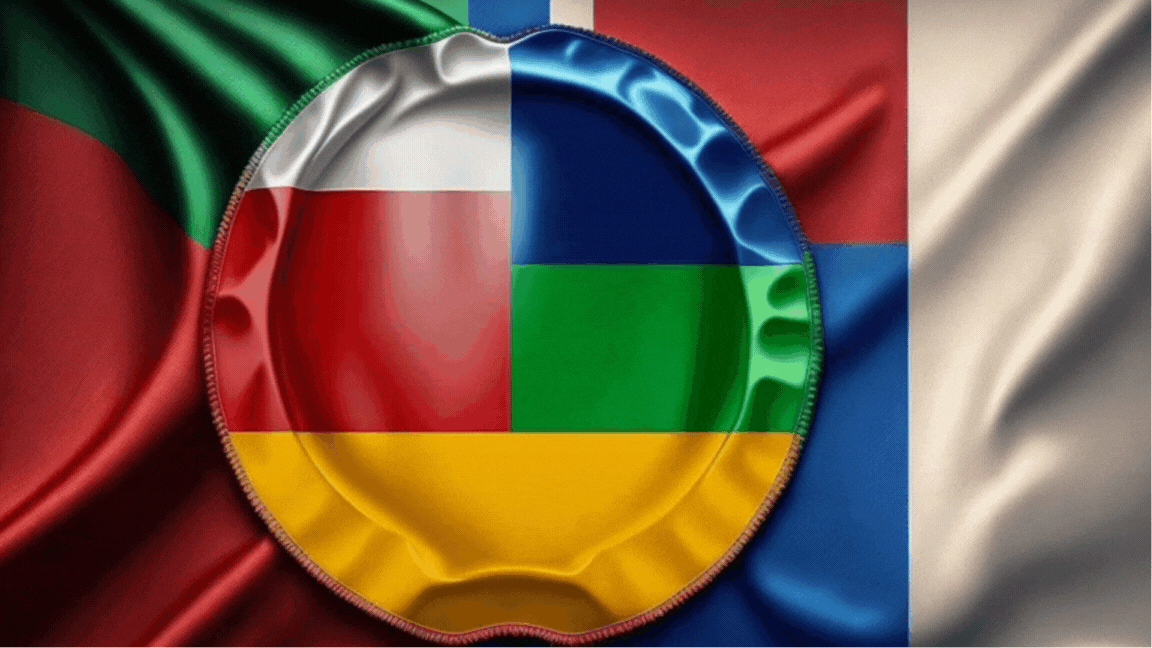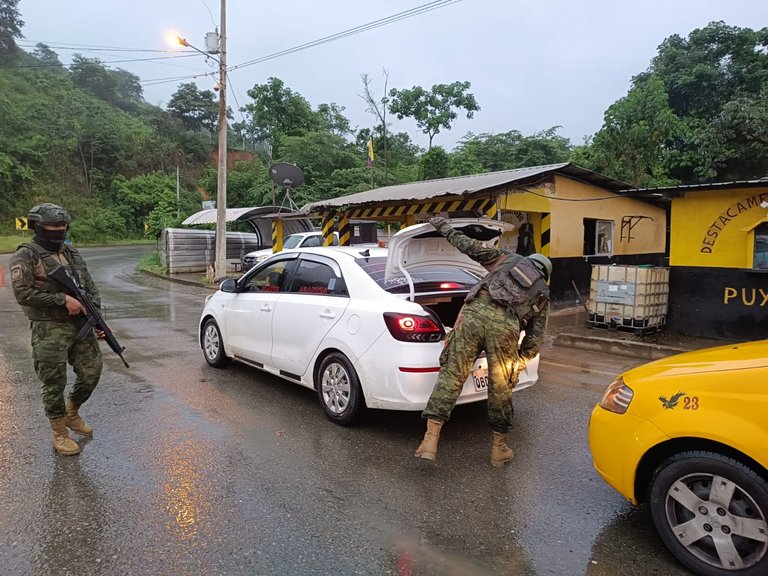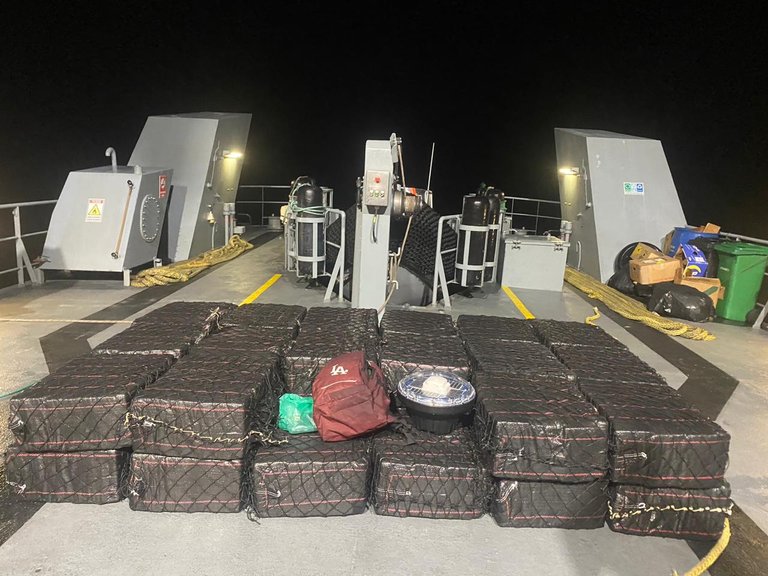The Latin American Report # 179

Ecuador, February 8
About a month after President Daniel Noboa declared the existence of an "internal armed conflict" in the country, following the escape from a prison in Guayas of the leader of a criminal gang at an undetermined date, and the surreal attack by an armed group on a television station while it was broadcasting live, the Government reported that it has arrested more than 6,600 people, of which about 240 are linked to terrorism. The Police and the Army have killed seven alleged criminals, while two policemen were murdered at the beginning of this new phase in the struggle to shake off the virus of insecurity. Nearly 2,000 firearms have been seized, along with more than 2,800 bladed weapons, some 1,050 gun magazines, approximately 107,000 bullets, and more than 9,800 explosives.
In a figure that comprises the largest drug seizure by historical records available in the country, the authorities have intercepted around 47 tons of drugs. Of the approximately 90 prisoners who have escaped from the penitentiary system—it is an important, revealing fact that there is no exact number—, among whom in addition to Adolfo Macías—the leader of Los Choneros, a criminal organization recently sanctioned by the United States—is Fabricio Colón Pico, another drug lord, only 34 have been recaptured. The very fact that these two individuals remain out of jail is a huge embarrassment for the Noboa government, even if there is an improved sense of security due to the deployment of the police and army in the streets (the rate of violent deaths went from about 28 a day, before the state of emergency, to about 11 a day).
 Source
SourceLast Sunday, the Ecuadorian Navy seized two tons of drugs on the coast of Esmeraldas, a province that precisely because of its location has become a stronghold of drug trafficking networks, like Guayas. The drugs were distributed in 50 packages wrapped in jute sacks and packing tape, which were found in a boat with 4 people 45 nautical miles from Esmeraldas. "In the military operation were employed personnel and different naval means, who located, intercepted and subsequently apprehended three Ecuadorians and a Colombian aboard an artisanal fishing boat sailing with three unregistered outboard motors", said the Navy. On Saturday, it was reported the seizure of approximately one ton of cocaine and the arrest of four other people in an operation carried out in cooperation with the Colombian Armed Forces.
It was also informed during the week that Spanish authorities, in collaboration with the Ecuadorian National Police and the EU Agency for Law Enforcement Cooperation, arrested some 30 people members of a criminal organization that would have introduced more than 3 tons of cocaine into the Iberian country from Ecuador. Agents of the Spanish National Police and Customs Surveillance raided an undetermined number of properties valued at more than 13 million euros, also blocked "financial products", recovered more than 400,000 euros in cash, and seized high-end vehicles. In Ecuador, where nearly 60 searches were carried out as part of the operation, the organization had its stronghold in Guayaquil, the capital of Guayas, which drug traffickers have brought to its knees with their reign of terror.
 34 packages of cocaine were seized in a boat on February 6, in the coastal province of Manta: the coast and the drugs (source).
34 packages of cocaine were seized in a boat on February 6, in the coastal province of Manta: the coast and the drugs (source).Finally here, senior officials from the U.S. Bureau of International Narcotics and Law Enforcement Affairs yesterday reviewed the implementation of two agreements aimed at strengthening the capacity of Ecuadorian forces. As part of the first results of this partnership, at the end of January, the United States transferred six trucks for logistics and transportation, 44 engines and operative systems for boats, ambulances, forklifts, and other assets. However, the connection with Washington has had undesired effects for the head of the Carondelet Palace due to his decision to deliver disused Russian military equipment in exchange for modern weaponry valued at 200 million dollars. The Biden administration added fuel to the fire by clarifying that the old Russian military equipment would be destined for the Ukrainian Army. The Kremlin had opposed the agreement by default and now five Ecuadorian banana exporters have their license to operate in Russia suspended due to the alleged "presence of pests" in their shipments.
Your quick regional roundup
Uruguay recalled its ambassador to Caracas for consultations on Thursday, in an action that sends a message to Nicolás Maduro given the electoral situation of María Corina Machado, the intended opposition candidate who is under a 15-year disqualification recently ratified by the highest judicial authority in her country. "We have decided to call for consultations with our ambassador in Venezuela to be informed about the worrying events that would make unfeasible the realization of free, democratic, and competitive elections in that country", said the foreign minister of the government of the right-wing Luis Lacalle. In the same sense, a resolution approved this February 8 in the European Parliament "stresses that neither the elections nor the electoral results will be recognized" if Machado does not participate in the contest. Then, what worries me, beyond the questionable interference in Venezuelan internal affairs, is that the media itself uncritically treats events such as the opposition primaries, which had legal bumps, and at the same time ignores by intention or unbearable "ignorance" other aspects that underpin somehow the narrative of the Miraflores Palace from the legal point of view.
Haiti's disputed Prime Minister Ariel Henry tried to defend his work as the head of the country's transitional government, and everything indicates that he will remain in power against the demands of many Haitians, who have been taking to the streets—increasingly violent—in the last few days demanding his resignation (his term of office was supposed to expire yesterday). The violence imposed by criminal gangs is swallowing larger and larger portions of the nation, especially in the capital itself. "I believe that the time has come for all of us to make decisions and come together to save Haiti", said Henry, adding that his government "is not the adversary", because it would be devoting all its forces and resources to fight the gangs. In any case, the leader expressed that he remains committed to building the context for the development of "democratic elections". "From the day I became prime minister, I began to talk to everyone: parties, the private sector, unions, civil society", he said.
Jesús Cárdenas Velázquez, a young Mexican regional music singer known as Chuy Montana, was shot dead in the border city of Tijuana, in the Mexican state of Baja California. Cárdenas was a performer of a controversial genre known as "corridos tumbados", characterized by praising in a certain way the world of drug trafficking, although not all of his lyrics point to this phenomenon. The body of the late artist, who was first kidnapped and then executed, was found on Wednesday by the Tijuana police on a highway, according to the state Attorney General's Office. Last year, one of the most popular artists of this genre—known as Peso Pluma—canceled concerts in the same town because of threatening messages that appeared there. The allusion to drugs in the lyrics has caused controversy even in the "distant" Chile, where authorities try to prohibit the diffusion of these "corridos tumbados" in the well-known festival of Viña del Mar, which is celebrated in the homonymous city, recently devastated by voracious fires that left a balance of 131 deaths in general.
And this is all for our report today. I have referenced the sources dynamically in the text, and remember you can learn how and where to follow the LATAM trail news by reading my work here. Have a nice day.


I appreciate very much your factual reporting of matters which are prevented from reaching me from other sources. However, because of the black hole of information about these events your reporting emerges from, I have little context in which to understand them. The in depth reporting on Ecuador's conflict provides such context, and I am able to grasp the derivation of the forces at play there.
I am left wondering if there is reasonable basis for the exclusion of María Corina Machado from elections because of unacceptable foreign influence, or some other reason, or if the actions merely reflect the oppressions of the Maduro administration as is the ubiquitous impression provided by Western propagandists.
Similarly, I am not informed of Haiti's interim leader's performance to date, since your reports appear in a void, I have no knowledge of whether he has been acting to strengthen civil society or has strengthened criminal elements and simply refuses to quit profiteering. While the protests may indicate popular distress because of the latter, in fact where druglords arise in poor locales they can often be very beneficial to those locales, providing funding for services corrupt governments do not, and people dependent for their survival and access to such services can become outraged when druglords and gangs they depend on are opposed by corrupt, or even legitimate but financially challenged governments.
This very principle seems to be behind the corridos tumbados, and the execution of the entertainer in Mexico likely to have been committed by some RWDS or covert arm of the Mexican government, or perhaps through gang rivalry (same thing, really) if the entertainer glorified one gang or another. Absent context, the best I can grasp of these events you report is that there is conflict in these places, but I am left without understanding the sides or how people there view them.
While we may not always agree, and I understand and admire your practice of objectively reporting, I feel your personal passion to advocate for and support marginalized people, and believe providing your subjective assessment regarding these events would provide some context. While it may be distasteful to you to resort to propaganda, in an informational void mere objective reports necessitate interpretation of the facts, to provide context otherwise unavailable for those whose sources prevent the necessary context from being availed to them. As long as you plainly state your biases I personally will weigh them against my own, and I feel competent to do this if you undertake to clearly differentiate the facts from how you feel about those facts in your reporting.
Thanks!
Thank you again for interacting with my work, and for your critical appreciation of it. I emphasize in a good way that it is critical because otherwise, it would not be worth it. Regarding the Venezuelan case, I have touched on some reports in greater detail what in this one I only skim over. It seems to me that it would be good for the country, regardless of whether Machado deserves to be disqualified or not, for her to go to the elections as part of a political agreement. Although if there is adherence to the law in the government's execution--which is disputable--I still understand that she is not be granted the grace. I particularly believe that there are reasons to defend her disqualification. I am quite allergic to those who make politics by going around asking powers like the United States to stand by them, undermining the sovereignty of their countries. But what I am mainly arguing is that neither the mainstream media nor many Venezuelans analyze the fine print of the legal decisions adopted. And what is even more outrageous is that they ignore the fact that there is a legal basis to make those decisions, to repress such behavior, even if the basis of their narrative is debatable.
You see, the opposition primaries could not be held without coordinating with the electoral authority. That is the law and they do not talk about it. You simply read that María Corina won the primaries. I do not know if the Chavistas are very smart, or the opponents are very stupid. They read the articles of the Constitution ignoring expressions at their convenience. So, the disqualification that weighs on her is conceived in the legislation as an authority that the Comptroller's Office has, and it is entirely constitutional, although I repeat that it is debatable the merits of the decision. The standard narrative is that Maduro is violating the Barbados agreements, and not at all. So far, he has complied impeccably with them. I do not know if, in the back-channel talks with the United States, he agreed otherwise, but with what is written he has fully complied. It never says there that all candidates who wish to do so may compete, but that in any case they must abide by the provisions of the constitution and the laws, and abide by the decisions that arise from their application. If the opposition wanted Machado to be firmly and safely on the ballot, they should have signed something else. I am being practical, at the same time that I have no commitment to the Maduro Government, nor do I rule out that most or all of the accusations against it are valid.
As far as Haiti is concerned, I do not rule out that there, as in Colombia or Mexico, this dynamic is happening, where vulnerable people depend in some way on the criminal structures themselves--to guarantee their safety, or even to buy a child's school bag--, but it seems to me that they are more victims than beneficiaries of their "shelter", if it exists. The truth is that if we are even positioned to see Ariel Henry as an honest and committed leader of his people--as always, there have been accusations of collusion with the gangs--, he has failed miserably to move his nation forward, although I don't think he could have done so in any way (the anomie there is very great). I believe that the people are certainly fed up with the poor conditions in which they live, in terms of anxiety about insecurity or the economy itself, which in the midst of all this is a relegated debate.
In the case of the murdered singer, the problem is precisely that there is not much more to go on, and it happens with this and other events where it is only documented that one or more were murdered, an investigation file was opened, and then we know nothing more. We don't even know what happened, or if at least my 4-year-old son's generation will someday know what happened to the 43 students of Ayotzinapa nine years back. That is a hard fact in itself. What comes across in the Chuy Montana affair is that somehow what he did as an artist was mixed in with the drug culture, if he was not fully into it (in one of his music videos he's seen wearing a bulletproof vest). And when that happens you are always in the crosshairs. Something similar occurs with Puerto Rican rappers, who in many cases have been in prison, and so they are not inventing anything in their lyrics, which are often loaded with violence and drug trafficking, but telling their reality, or at least the one they appreciate first hand.
I assume with great humility the call you make at the end of your comment. I have tried to write these reports in this way. Many times the pressure of time prevents me from abounding, although I dedicate a good part of my day to this project. But along the way, I will figure out how to make that distinction clearer. Thanks for encouraging and supporting this effort!
I greatly appreciate the additional context you have generously taken the time to provide me.
Thanks!